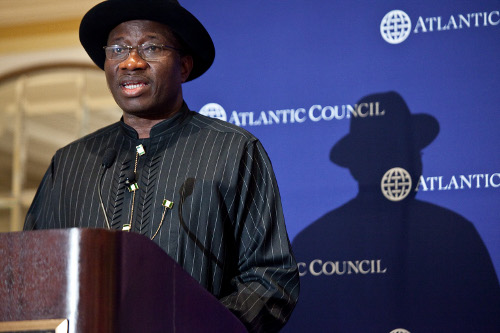
Had there been more time, I would have be interested in pursuing some of the tantalizing statements about Nigeria’s foreign policy that Acting President Goodluck Jonathan made in his remarks launching the Atlantic Council’s Michael S. Ansari Africa Center yesterday. The chief executive — who was one of the 47 leaders invited to Washington to take part in the Nuclear Security Summit — stressed the importance of a stable Niger Delta (which is, after all, a key source of energy for the United States) and implicitly made the case for why a West Africa at peace and prosperity matters to the larger Atlantic community.
The acting president reaffirmed Nigeria’s determination to "live up to its responsibilities" as an important regional power. Noting that his country has already expended a good deal of its "blood and treasure" to end destructive conflicts in other parts of West Africa, he observed that it is time for Nigeria to take its place alongside the United States and others as a "strong actor for peace" in the world.
I have been a proponent of redefining the Atlantic community "southward," to make a greater effort to pursue closer security and economic links with Latin America, the Caribbean, and West Africa. I was pleased to hear president Jonathan praise the newly-created bilateral commission that has been set up between the United States and Nigeria, created in recognition of the "need to maintain regular, high-level consultations" on an entire agenda of issues between Washington and Abuja.
But part of this shift also requires changing the nature of the dialogue among the American foreign policy community. Not surprisingly, much of the discussion that followed with the acting president focused on questions of economic development, corruption and election reform in Nigeria — all very important issues, to be sure. However, it feeds into the continuing perception that Africa is a problem to be solved, rather than an emerging component of a renewed Atlantic community.
Should we be thinking of closer coordination (in security terms) between NATO and ECOWAS (the Economic Organization of West African States) in terms of both preserving the peace on land by continuing and effective interventions to keep the peace, but also perhaps expanding the efforts to encompass maritime security — to address with the growing problems of piracy and drug trafficking? In order to diversify American (and European) options for energy, is it time to conceive of a new energy dialogue that would knit together some of the far-flung components of an expanded Atlantic world — with countries like Nigeria and Brazil poised to play a major role? And while the Obama administration has shown interest in developing a trans-Pacific free trade association, should be also be exploring the first attempts at a Free Trade Association of the Atlantic region?
Atlantic Council president Fred Kempe, in introducing the program, talked about the theme of the "renewal" of the Atlantic community. We now have a very mature and developed set of security, economic, and political connections that tie together North America and Europe. President Jonathan’s remarks highlight the importance of crafting a coherent vision for an expanded Atlantic community that brings together the nations of both the north and south Atlantic regions.
Nikolas K. Gvosdev [email], an Atlantic Council contributing editor, is on the faculty of the U.S. Naval War College. The views expressed are his own and do not reflect those of the Navy or the U.S. government.
Image: GoodluckJonathanACUS.jpg
